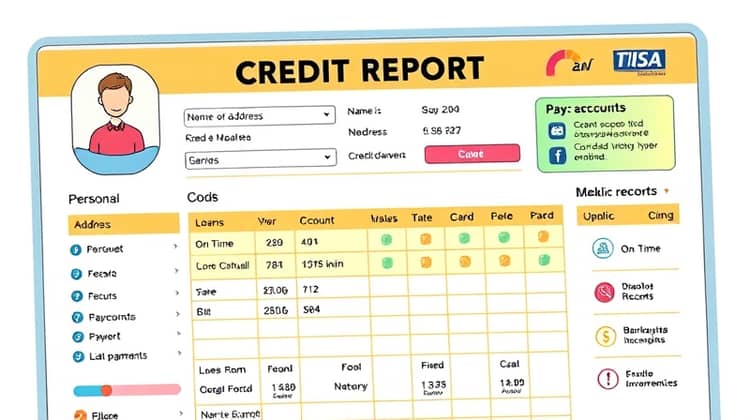In today's financial landscape, understanding credit reports is crucial for anyone looking to secure a loan. These reports are essential tools that lenders use to assess an individual’s creditworthiness. With the right knowledge of what a credit report entails, individuals can better navigate the loan approval process and work on improving their credit score over time.
This article aims to provide an in-depth understanding of credit reports, how they affect loan approval, and the various stages involved in the lending process. Whether you are buying a home, financing a car, or applying for personal loans, insights from this guide will empower you to take charge of your financial future.
What is a Credit Report?

A credit report is a detailed summary of an individual’s credit history and current credit standing. It includes information about borrowing and repayment behaviors, which can be used by lenders to make informed decisions regarding loan applications. Essentially, it consists of data provided by various credit bureaus about an individual’s debts, payment history, credit lines, and more.
The information collected in a credit report typically spans several years and provides a comprehensive view of the individual’s financial dealings. Highlighting both positive and negative factors, it reflects how responsible an individual has been in managing credit.
How Credit Reports Impact Loan Approval

Credit reports play a pivotal role in the loan approval process. When applying for a loan, lenders will review your credit report to evaluate your creditworthiness and determine the likelihood of repayment. A good credit report often leads to favorable loan terms, while a poor report can result in higher interest rates or even loan denial.
For many borrowers, understanding the implications of their credit report on loan approval is critical. A strong credit report with a history of timely payments, low credit utilization, and minimal debt can lead to quicker and easier loan approvals. In contrast, derogatory marks like late payments or bankruptcies can signal risk to lenders, complicating the approval process.
Key Components of a Credit Report

Several key components collectively form the structure of a credit report. By understanding these elements, individuals can identify areas of improvement and monitor their financial health effectively.
- Personal information (name, address, SSN, date of birth)
- Credit accounts (credit cards, loans, mortgages)
- Payment history (on-time, late, or missed payments)
- Credit inquiries (hard inquiries vs soft inquiries)
- Public records (bankruptcies, liens, judgments)
How to Obtain Your Credit Report

Obtaining your credit report is a straightforward process and is crucial for anyone looking to improve their credit score or prepare for a loan. Using the right channels can ensure that you access your report safely and accurately.
- Visit AnnualCreditReport.com, the official site for free reports.
- Request a report from one or more credit bureaus (Experian, TransUnion, Equifax).
- Provide the necessary personal information to verify your identity.
- Review your credit report carefully for accuracy.
- Dispute any errors you may find directly with the reporting bureau.
Understanding Your Credit Score

Your credit score is a numerical representation of your creditworthiness, derived from the information in your credit report. Ranging from 300 to 850, higher scores indicate better credit profiles. These scores are categorized as poor, fair, good, very good, and excellent, each having implications for loan approval.
Several factors contribute to calculating your credit score, including payment history, credit utilization ratio, length of credit history, types of credit in use, and new credit. Understanding these metrics can empower you to manage your financial health better and prepare for successful loan applications.
Tips for Improving Your Credit Score:

Improving your credit score is a journey that involves consistent efforts and smart financial habits. By focusing on specific practices, individuals can enhance their credit profiles and increase their chances of obtaining favorable loan terms.
- Pay bills on time to establish a positive payment history.
- Keep low balances on credit cards to maintain a healthy credit utilization ratio.
- Avoid opening multiple new credit accounts within a short timeframe.
- Regularly check your credit report for errors and rectify them promptly.
- Limit the number of hard inquiries to your credit report.
The Loan Approval Process

The loan approval process can often be complex, but understanding its stages can equip borrowers with the knowledge they need to navigate it successfully. From pre-qualification to closing, each step has its unique significance, and being well-prepared is key.
Successful loan approval hinges not only on an individual's credit report and score but also on various factors such as income, employment stability, and the amount requested. Lenders assess all these elements during the evaluation process.
- Pre-qualification: Assessing eligibility.
- Application: Submitting necessary documentation.
- Underwriting: Risk assessment by the lender.
- Approval: Final decision on loan application.
- Closing: Completing the transaction.
Overall, understanding each phase of the loan approval process can demystify what is often a daunting experience for many borrowers and help them set realistic expectations.
1. Pre-Qualification
Pre-qualification is an initial step in the loan process where borrowers are given a rough estimate of how much they may be eligible to borrow. It typically involves a soft credit check that will not harm their credit score and usually requires minimal documentation.
During pre-qualification, lenders consider basic financial information, including income and existing debt, allowing individuals to understand their potential borrowing power before moving to the application stage.
- Lender assesses basic financial status.
- Loan limits are roughly established.
- No impact on credit score during this step.
- Self-assessment of financial readiness.
Many potential borrowers find pre-qualification helpful to know what to expect and to address any possible issues with credit or finances before making a formal loan application.
2. Application
Once pre-qualification is complete, the next step is to formally apply for the loan. This stage requires submitting a detailed application form along with a range of supporting documents. The information typically needed includes proof of identity, income, assets, and detailed credit history.
The lender uses this documentation to perform a hard credit inquiry, which will affect your credit score temporarily. This inquiry is essential for the lender to make an informed decision regarding your loan application.
- Complete a formal application form.
- Submit required documentation.
- Provide proof of income and assets.
- Authorize a hard credit inquiry.
Understanding the importance of a well-furnished application can significantly enhance the chances of receiving an approval, so borrowers should pay attention to their application details.
3. Underwriting
Underwriting is a critical stage in the loan approval process where lenders evaluate the risk involved in granting a loan. An underwriter reviews all submitted documents, assesses the borrower's financial stability, and examines the property's value in real estate scenarios.
This detailed assessment helps lenders determine whether to approve or deny the loan application based on a thorough consideration of both the borrower's profile and the loan request.
- Lenders assess risk using financial data.
- Underwriters validate documentation provided.
- Property value is appraised in real estate loans.
- Decisions are made based on risk analysis.
The underwriting process can take anywhere from a few days to a few weeks, depending on the complexity of the loan and the lender’s requirements, and is a crucial stage that determines the loan outcome.
4. Approval
After the underwriting process is complete, the outcome will be communicated to the borrower. If approved, the lender will outline the loan terms, including interest rate, repayment period, and monthly payments. If denied, the lender is required to provide reasons for their decision, which can be valuable for understanding and addressing credit issues in the future.
Approval typically comes with more steps, including final verification of terms and conditions. Being informed about what approval entails can help borrowers prepare for the next stage effectively.
- Loan terms are outlined clearly.
- Lender communicates decision to the borrower.
- If denied, reasons are provided for transparency.
- Preparation for closing begins based on approval.
Being approved for a loan is an encouraging milestone, yet the path to closing involves further responsibilities and steps to ensure the process is successful.
5. Closing
Closing is the final step in the loan approval process, where all parties meet to finalize the transaction. During this meeting, the lender will present the loan documents for the borrower to sign, confirming all terms and conditions of the loan agreement.
It is also at this stage that any closing costs and fees are paid, and ownership is officially transferred in the case of mortgages or real estate loans. A successful closing marks the end of the approval process and the beginning of the borrower's financial commitment.
Conclusion

Understanding credit reports and the loan approval process is imperative for anyone looking to secure a loan. By being proactive in maintaining and improving their credit profile, individuals can support their journey toward financial success and increase their chances of approval in the future.
In summary, knowledge is power when it comes to managing credit. By following the outlined steps and tips, borrowers can navigate the complexities of loan applications confidently and successfully achieve their financial goals.














